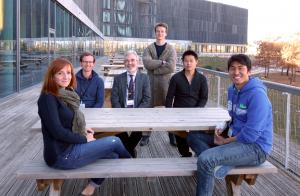Two years in "the place to be"
They are almost halfway through their two-year fellowships and all agree that in their respective fields, ITER is the place to be.
Under the postdoctoral fellowship Partnership Arrangement signed between the ITER Organization and the Principality of Monaco, five young scientists have been recruited every two years since 2009 to be trained, over a period of two years, in research areas related to ITER.
In this framework, talented young scientists and engineers from the seven ITER Members plus Monaco have the opportunity to carry out advanced research in specialized areas of fusion science and technology.
The five postdoctoral fellows selected in 2015 (the fourth group) come from China, Korea and the European Union.
Chao Zhou is from China but he completed his PhD in superconducting applications and cryogenics in the Netherlands at the University of Twente. His research focused on strain-reduced transport properties in superconducting materials for a joint project between Royal Netherlands Academy of Arts and Sciences (KNAW), the Chinese Academy of Sciences (CAS) and the University of Twente. At ITER he joined the Superconductor Systems & Auxiliaries Section of the Magnet Division, where he works on the electromagnetic analysis of the ITER magnet system and on the magnet manufacturing database. "It is a truly unique opportunity for me to thoroughly understand the R&D and production chain—from superconducting material, to strand, and all way to cable-in-conduit conductor—as well as production data tracking through the conductor and manufacturing databases," says Chao. "This time at ITER is an exceptional experience for me."
After his Masters in nuclear engineering in Korea, Doohyun Kim spent five years in Switzerland where he obtained his PhD degree at the Swiss Federal Institute of Technology EPFL in February 2015. His main research topic was the real-time control of MHD (magnetohydrodynamic) instabilities. At ITER, he is working in the Stability & Control Section of the Science & Operations Department, where he focuses on the advanced plasma control system, principally in the domain of actuator sharing. His work includes the development of an actuator management (sharing) algorithm and the application of the control system in existing tokamaks to validate its feasibility.
Christian Vorpahl from Germany graduated from Karlsruhe University (KIT today) and the French Engineering School ENSAM. He majored in analytical mechanics and fusion technology and his diploma thesis focused on the microstructure property correlation of Eurofer steel, the European candidate structural material for the next-phase device DEMO. Christian earned his PhD at the Max Planck Institute for Plasma Physics (IPP) working on the ASDEX Upgrade tokamak where he built a measurement system for in-service deformations, which mainly occur as a result of plasma disruptions and AC operation of the internal coils. He worked as a postdoc at IPP in the European Domestic Agency project for the development of the ITER diagnostic pressure gauge for one year before joining ITER.
In the ITER Diagnostics Division, Christian is taking care of the global coordination of the development of diagnostic shutters. Close to the plasma, these shutters will protect optical diagnostics' first mirrors, mainly from excessive deposition, and thereby ensure the functioning of the diagnostic. Approximately 60 shutters will be required by up to 20 different diagnostic systems. Christian also contributes to the development of cleaning systems for diagnostic mirrors, which is closely related to the context of shutters, and provides support to the pressure gauge development at ITER as well as to diagnostic port plug engineering. "I couldn't have such a diverse fusion-related work experience anywhere but at ITER," says Christian. "For me it's a dream come true."
For Stephanie Panayotis, from France, working in a pluricultural and pluridisciplinary project has always been an objective. She specialized in thermonuclear fusion and its interaction with surrounding materials and then completed a PhD at the French Alternative Energies and Atomic Energy Commission (CEA), working on the Tore Supra tokamak in the frame of the international project DITS (deuterium Inventory in Tore Supra). She focused on fuel retention and succeeded in building a global description of the fuel cycle in carbon plasma-facing components by combining experimental and modelling results.
At ITER, Stephanie has now joined the tungsten divertor team, in charge of the component that will receive the largest heat fluxes from the plasma. She is working on the characterization program that will provide major information on the properties of tungsten and ensure that the required material specification will be met during production to avoid damage during the ITER operation.
Wouter Dekeyser, from Belgium, earned his PhD at Katholieke Universiteit (KU) Leuven in early 2014. As a computational engineer, his PhD research focused on the development of advanced algorithms for automated divertor design based on edge plasma simulations, using efficient adjoint techniques for sensitivity analysis. He then held a postdoctoral researcher position throughout most of 2014 at the Forschungszentrum Jülich in Germany, where he worked on hybrid fluid-kinetic neutral gas models for edge plasma simulations before joining the ITER Organization.
As part of the Divertor Section at ITER, Wouter now works on a new version of the SOLPS-ITER code package, the edge plasma simulation tool used throughout the fusion community that is being developed at the ITER Organization with the support of colleagues within the ITER partners. "It is an honour and a pleasure to work with and learn from leading scientists in my field every day and to be able contribute to one of the most challenging energy projects of our time," says Wouter.


